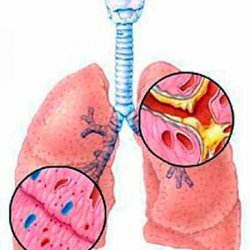Hib vaccine: what is it and what does it protect?
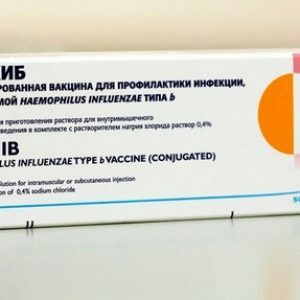 The large-scale practice of immunizing children against Hib infection began in the mid-1980s, since 1990 Hib vaccination was introduced into the vaccination schedule in the US, Canada and some countries in Western Europe.Subsequently, in these countries, children became much less likely to suffer from meningitis, pneumonia, epiglottitis, sepsis and other very dangerous diseases caused by Hib infection.Today, HIB vaccination is carried out by small children in many countries around the world.In Russia, at the state expense, children are being vaccinated from at-risk groups, all the other children parents can pay a paid vaccination in any medical institution that provides such services.
The large-scale practice of immunizing children against Hib infection began in the mid-1980s, since 1990 Hib vaccination was introduced into the vaccination schedule in the US, Canada and some countries in Western Europe.Subsequently, in these countries, children became much less likely to suffer from meningitis, pneumonia, epiglottitis, sepsis and other very dangerous diseases caused by Hib infection.Today, HIB vaccination is carried out by small children in many countries around the world.In Russia, at the state expense, children are being vaccinated from at-risk groups, all the other children parents can pay a paid vaccination in any medical institution that provides such services.
What is Hib?
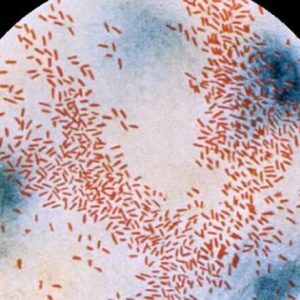 The abbreviation HIB hides the name of the microorganism Hemophilus Influenza type B( Haemophilus stick type B). All diseases caused by this pathogen are combined into one group, which I classify as a hemophilic infection.
The abbreviation HIB hides the name of the microorganism Hemophilus Influenza type B( Haemophilus stick type B). All diseases caused by this pathogen are combined into one group, which I classify as a hemophilic infection.
Hemophilic rod type B has a number of features that allow it to enter the bloodstream from the site of primary localization( usually the airways) and spread throughout the body, provoking the formation of purulent foci in various organs - the brain, lungs, joints, ears and t.
The most common clinical manifestations of hemophilic infection are the following acute diseases:
- Purulent meningitis.
- Epiglottitis( inflammation of the epiglottis), which leads to the development of croup.
- Pneumonia.
- Arthritis.
- Cellulitis is an inflammation of the subcutaneous fat.
- Sepsis is a general inflammatory reaction of the body that occurs in response to the entry of pathogenic bacteria into the bloodstream.
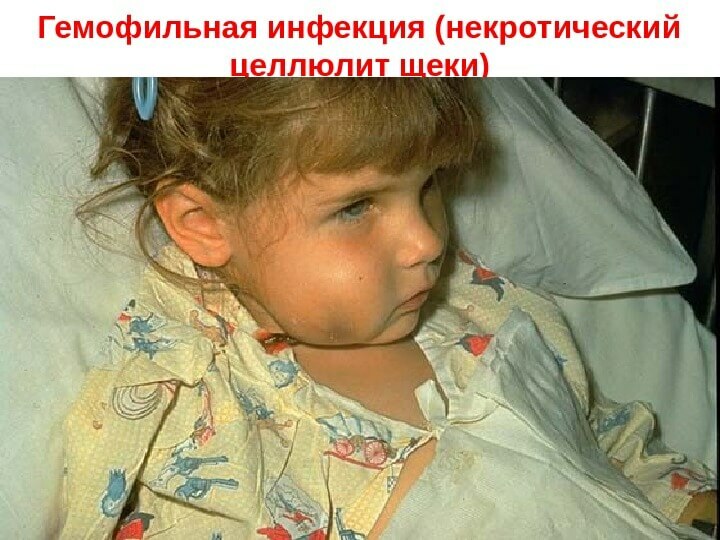
All these diseases develop mainly in those children who do not have immunity to HIB. Babies of the first two years of life are especially prone to the occurrence of severe forms of hemophilia infection.To protect them can only timely vaccination( started with a 3-month-old age).Of course, it does not give an absolute guarantee: the children who received the vaccine are also infected with a hemophilic rod and get sick, but they have an ailment like an ordinary ARI or are practically asymptomatic.
A child can be confronted with a Hib infection anywhere( the pathogen will enter the human body from the air - by airborne droplets). Many people for years have been carriers and distributors of dangerous hemophilic rods, but do not even know it.
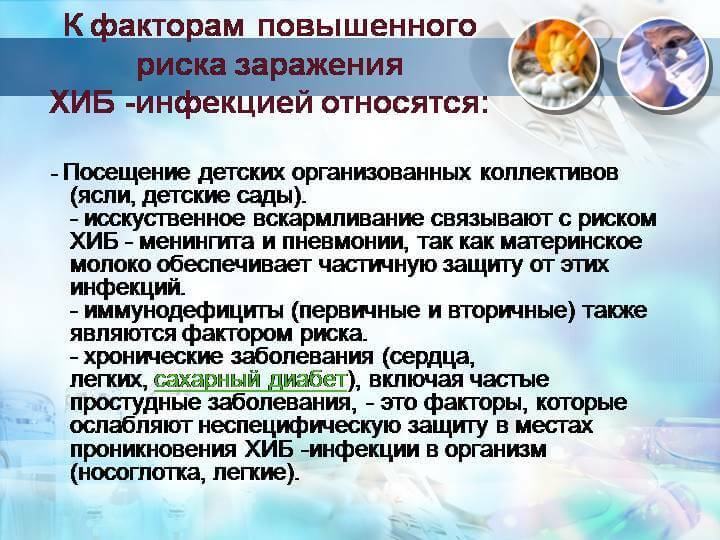
Important: is especially dangerous in terms of infecting hemophilic infection in children's groups, so parents, when giving the child to a kindergarten, must necessarily vaccinate him from HIB.
Indications for vaccination HBI
Hib vaccine must be given to all children under 5 years of age. More adult children, as a rule, already have immunity to a hemophilic infection,( since they have at least once encountered it in a kindergarten or school), therefore for them severe forms of the disease are not dangerous.This is confirmed by long-term observations of Hib infection: among children after 5 years and adults, extremely infrequent meningitis, pneumonia, and epiglottitis are caused by the hemophilic rod.
However, some groups of children are being vaccinated with HIB irrespective of age, one can say for life reasons.At them in case of infection with a hemophilic rod there is the highest risk of development of the most serious forms of an infection - a meningitis, a pneumonia, a sepsis. Children with are classified as at risk:
- with immunodeficiencies;
- with oncological ailments;
- serious developmental defects;
- with a long history of the use of immunosuppresants;
- HIV infection( here also include babies born from HIV-infected mothers);
- aspiration( absence or absolute dysfunction of the spleen).
In addition, in Russia, children from children's homes are subject to mandatory vaccination against Hib infection.
Contraindications to vaccination Hib
Absolute contraindication to Hib vaccination is allergy to the vaccine or its individual components. This fact is established by the abnormal reaction of the body to the previous inoculation.
Temporary withdrawal from vaccination to the child can be given if at the time of the examination he has an acute disease or exacerbation of a chronic illness.To inoculate HIB to such babies it is possible in some weeks after convalescence or improvement of a status.If the disease was not severe( for example, ARI, intestinal disorders), vaccination is carried out immediately after the normalization of body temperature, stool, etc.
To avoid any misunderstandings and undetected diseases, which are contraindications to the introduction of the vaccine, a physician should examine the child before each vaccination.
Vaccination schedule HBD
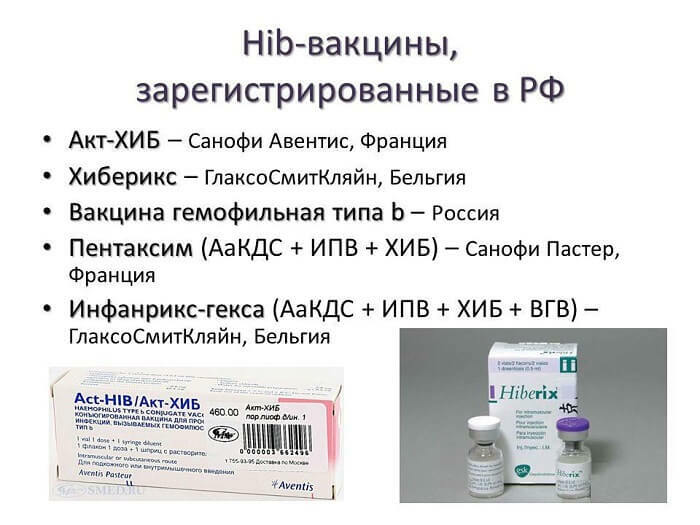
The vaccination schedule for Hib infection is determined by the age at which this vaccination begins:
- If the child is 3 months old , then the HIB vaccine is done with the DTP( often used for thisCombined preparations, for example, Pentaxim).The following vaccinations are carried out at 4.5 and 6 months, and revaccination at 18 months.The schedule can be shifted if, for example, the first inoculation is done not in 3, but at 4 months, but in general for children up to 6 months the principle of immunization from Hib infection should be this.
- If the vaccine is needed for a child who already has for 6 months of , but not yet a year, the following schedule is used: 2 vaccinations are administered at monthly intervals and revaccinations one year after the second vaccination.
- Babies from 1 year to 5 years of , not vaccinated earlier from Hib, are given a single immunization.
Thus, do not get upset if for some reason the inoculation had to be postponed.The pediatrician will always be able to choose the most suitable and effective vaccination scheme, depending on the age of the small patient.
Preparation for vaccination HBI
No special preparation required.Parents need only follow general guidelines:
- Ensure that the child does not come into contact with infectious patients, less is in closed crowded rooms, etc.
- Do not make sudden changes in the nutrition of the baby.
- Follow the chair of the child( if there is a tendency to constipation, take measures for the normal evacuation of the intestine).
Side effects of Hib
Hib vaccination by babies is easily tolerated. In 10% of cases, the following post-vaccination reactions are possible( developing at the site of vaccine administration):
- redness;
- seal;
- soreness.
Less frequent increase in temperature( up to 38 degrees).Irritability, tearfulness, and poor appetite may also appear.If vaccination with Hib was done with a complex drug( along with DPT), the response to vaccination may be more pronounced, but this is due not so much to the HIB component as to the DTP.
In general, those rare and minimal consequences of HIB vaccination are completely incommensurable in terms of the risk to the life of a child with ailments that cause a hemophilic rod. It is better to knock down the temperature once and together with the baby to transfer his vagaries, than to face such a terrible disease as meningitis or septicemia.
Zubkova Olga Sergeevna, medical reviewer, epidemiologist



